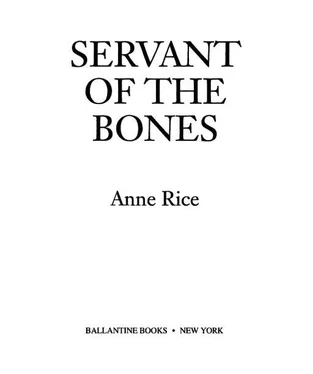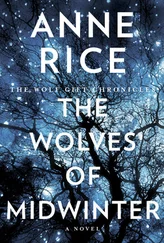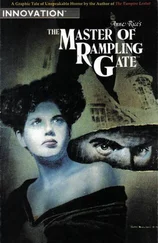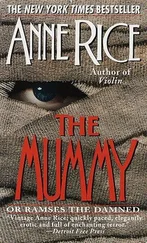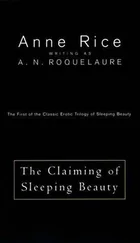“Oh, my god, they will not help me!” I sang out the words in Chaldean. “I am here again and there is no righteous path!”
The old man stood rapt, and repelled. He was full of shock and loathing. He threw out his hands:
“Be gone, spirit, out of here, out of the air, and back into the bones whence you came!”
I felt a silken thrill through my limbs. I held firm.
“Rebbe, you said he killed her. Tell me if he did. I slew the men who stabbed her!”
“Be gone, spirit.” He threw up his hands over his face, and turned his head. His voice grew stronger. He stepped from behind his desk and walked about me in a circle, shouting the words again, louder, more clearly, his hands flashing in front of me. I felt myself weaken. I felt the tears on my face.
“Why did you say, Rebbe, that he had killed Esther? Tell me and I shall avenge her! I killed the hirelings! Oh, Lord God of Hosts, when Yahweh spoke to Saul and David, he said slay them all to the last man, woman, and child! And Saul and David obeyed him. Was it not right to slay those three filthy men who murdered an innocent girl?”
“Be gone, Spirit!” he cried. “Be gone! Be gone. I will have no traffic with you. Go back into the bones!”
“I curse you, I hate you!” I said to him, but it had no sound.
I was dissolving. All that I had gathered to myself was dispersed, as if the wind had found its way beneath the door and caught hold of me.
“Be gone, Spirit, be gone from here, be gone from my house and from me!”
Blackness.
Yet I couldn’t stop thinking.
I couldn’t stop being.
I will see you again, old man .
Dreams came to me as if I were human and I slept, and my mind had opened its doors to living teachers. No, Azriel, no, perish, but don’t dream.
Yet there came the face of Samuel; Strasbourg; another sanctuary of scrolls and books and it was in flames. I heard my voice. “Take my hand, Master, take me with you into death.” Damn you, Samuel! Damn you, old man.
Damn you, all you Masters!
From the top of a hill I looked down on the small city of Strasbourg. Oh, it was nothing so clear then as it was when I described it to you.
But it was there, I saw it. I knew that all the Jews were suffering. I knew I was one of them. And yet I couldn’t be one of them. And the bells pealed. The arrogant bells of murderers came from their churches. And the sky was the silent heavy sky of olden days—six hundred years ago—perhaps when the air didn’t talk and so clearly I heard the bells.
“Azriel.” Chatter. Wind. The invisible were coming, they were coming to me in smoky mist, surrounding me, closing in, smelling the weakness, the fear, and the suffering. “Azriel!” The rumblings of the jealous earthbound surrounded me. The greedy desperate earthbound dead.
Get away from me. Let me remember .
I wanted to know, I wanted to push past all of them as I had the people on the sidewalk when Esther had looked at me. I wanted to remember, I wanted to…
For one instant, I stood bright, staring at the Rebbe, but the Rebbe was huge, and his voice was louder than the wind.
Be gone, Spirit! I command you! The old man’s face was blood red with his fury.
Be gone, Spirit!
His words struck me. They hurt me. They lashed me. Give me silence for now. If there can be no peace, there can be silence and there can be the darkness. It could be worse, Azriel.
It could be worse.
To be wounded is bad, but not so bad as to kill the innocent and to smile with hate.
17
There are several things I should have attempted. I should have tried to leave the room, intact, and follow Gregory. I had a visible body! I had clothed it perfectly. I should have hung on. I should have tried to wander freely in the streets of Brooklyn and discover more about the world, simply by asking more specific questions of it.
I should have discovered specifics about Gregory Belkin and the Temple of the Mind. People in the streets would have talked to me about these things. I looked like a man. I could have watched the television broadcasts in taverns. I could have spent a night of fruitful, focused learning instead of letting the old Rebbe drive me away from my own self, and into nothingness once more.
Whatever, when the Rebbe sought to destroy me, I should not have wasted time calling out to “my god.”
That had been an unthinkable thing for the Servant of the Bones—to call upon my god—for my god had never been with me in my years of evil spectral service. I don’t think the Servant of the Bones who cursed Samuel even remembered my god, because he did not remember being human, as I remembered now. My god had been mine when I was a man, a young man living in the city of Babylon where I had died.
Indeed, though I hate to admit it, if I bring to mind Samuel, I remember only how proud I was to be his genii, a ghost of remarkable powers such as simple dead souls almost never acquire. I was the mighty culmination of ancient magic and men who knew how to use it.
Of human life, I had recalled nothing. I could not even recall a Master before Samuel, though surely there had been such men. Back to Babylon there must have been a lineage of such magicians, all of whom I’d served and outlived.
It had to be so. It was so. The Servant of the Bones was passed hand to hand.
And at some point, as the Rebbe had so graciously explained for Gregory’s benefit, the Servant of the Bones had rebelled against his solemn purpose. He had turned around in the very midst of his magic and lashed out at the one who had called him into being, and the Servant of the Bones had done this more than once.
But what had preceded all this? Had I not once been human?
What did my memories want of me? What did Esther want of me? Why was it seductive to have eyes and ears, to feel pain, and to hate again, and to want to kill? Yes, I very much wanted to kill.
I wanted to kill the Rebbe, but then again I could not. I held him to be a good man, a man perhaps without blemish, except for want of kindness, and I couldn’t do it. There is only so much evil for which you can blame others. I couldn’t kill him. I was glad I had not.
But you can imagine what a mystery I was to myself, caught between Heaven and Hell and not knowing why I had come.
But I was not of God, no, I was not of God and I had no god, and when the Rebbe banished me, when he used his considerable power to dissolve my form and addle my wits so that I could not oppose him, he had done so in the name of God and I had not dared to call upon that same God, the God of my father, the Lord God of Hosts, the God above and before all Gods.
No, in that moment of weakness, Azriel, man and ghost, had called upon his pagan god of old, from a human time, a god whom he had loved.
As the Rebbe cursed me, I deliberately called on Marduk in Chaldean. I wanted the Rebbe to hear the pagan tongue. Anger burnt me up as it has so often done. I knew my god wouldn’t help me.
Some parting of the ways had occurred with me and my god.
Must I now recall everything? Must I know the story from the start?
Well, if I sought to put it together, to understand it, to know who I had been and how I’d been made the Servant of the Bones, there should be but one reason: so that I might die.
Really, really die.
Not just retreat into blackness again, to be called forth into another lurid drama, and surely not to be trapped, earthbound, with the lost souls who murmured and stammered and screeched as they clung to mortality. But to die. To be given at last what had somehow been denied me years ago by a trick I couldn’t recall.
“Azriel, I warn you.” Who had spoken those words then, thousands of years ago? A phantom? Who was the man I saw dimly at the richly carved table who cried and cried? Who was the King? There had been a great king.…But my anger and my rage had weakened me so that I was shocked and dispersed by the Rebbe. My mind was blown apart as surely as my form. My capacity to reason was shattered, and I rose into the night formless, aimless, drifting once more among the electric voices, tumbling as it were above the magnet that holds us all—the spinning world.
Читать дальше
